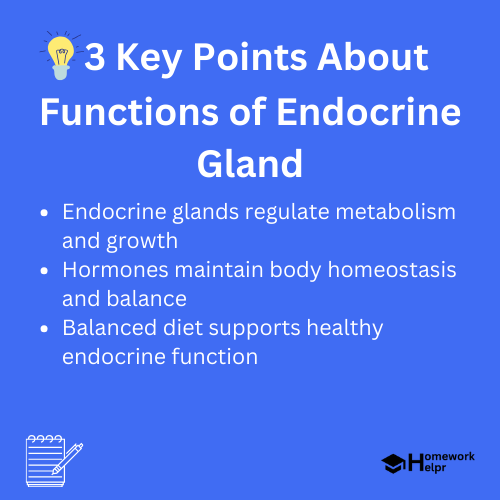📝 Summary
The endocrine gland system is crucial for regulating various physiological functions in the human body. Endocrine glands release hormones directly into the bloodstream, acting as chemical messengers that influence processes like growth, metabolism, and reproduction. Key functions include metabolism regulation, growth and development, reproductive functions, and stress response. Important glands such as the pituitary, thyroid, and adrenal glands play distinct roles in maintaining homeostasis and hormonal balance. An imbalance in hormones can lead to disorders such as diabetes and thyroid problems. A balanced diet, exercise, sleep, and stress management are essential for supporting healthy endocrine function.
Functions of Endocrine Glands
The human body is governed by a complex network of systems that regulate various physiological functions. One of the most vital components of these systems is the endocrine gland system. Endocrine glands release hormones directly into the bloodstream, where they travel to different organs and tissues, orchestrating an array of body functions. In this article, we will explore the various functions of endocrine glands, their significance, and how they maintain body homeostasis.
What are Endocrine Glands?
Endocrine glands are specialized organs that produce and secrete hormones, which are chemical messengers that communicate information throughout the body. Unlike exocrine glands, which release their products through ducts, endocrine glands work by secreting hormones directly into the bloodstream. Hormones influence various processes, including growth, metabolism, and reproductive functions.
Definition
Hormones: Chemical substances produced in the body that regulate the activity of cells or organs.
Example
For instance, insulin is a hormone produced by the pancreas that helps regulate blood sugar levels.
Main Functions of Endocrine Glands
Endocrine glands play several vital roles in the body. Understanding their functions helps us appreciate how our body maintains health. Some of the primary functions include:
- Metabolism Regulation: Hormones from the thyroid gland, such as thyroxine, regulate how the body utilizes energy.
- Growth and Development: Growth hormone (GH), produced by the pituitary gland, is crucial for growth during childhood and adolescence.
- Reproductive Functions: The adrenal and gonadal glands produce hormones like estrogen and testosterone that are essential for reproduction.
- Stress Response: The adrenal glands release cortisol during stressful situations, helping the body to manage stress effectively.
- Homeostasis: Hormones maintain balance in bodily functions, such as blood sugar levels, immune response, and water balance.
Key Endocrine Glands and Their Functions
Now let’s delve deeper into some of the key endocrine glands and their specific functions:
- Pituitary Gland: Known as the “master gland,” it controls the functions of other endocrine glands and secretes hormones that influence growth, metabolism, and reproduction.
- Thyroid Gland: Producing thyroid hormones (T3 and T4), it regulates metabolism, body temperature, and heart rate.
- Adrenal Glands: Located on top of each kidney, these glands release hormones like adrenaline and cortisol, which help in the body’s response to stress.
- Pancreas: Aside from its digestive functions, it regulates blood sugar levels through the release of insulin and glucagon.
- Gonads (Ovaries and Testes): These produce sex hormones that are crucial for sexual development and reproductive processes.
Hormonal Interactions
The endocrine system functions through complex feedback mechanisms. Hormonal interactions often involve two types of feedback: positive and negative.
- Negative Feedback: This is a common mechanism where the production of a hormone inhibits its own production. For example, high levels of thyroid hormones signal the pituitary gland to reduce thyroid-stimulating hormone (TSH).
- Positive Feedback: This is less common but occurs when a hormone’s effect increases its production. An example is oxytocin during childbirth, where increased contractions lead to more oxytocin release.
💡Did You Know?
Did you know that the human body has over 50 different hormones, each responsible for specific functions?
The Importance of Hormonal Balance
Maintaining a proper balance of hormones is critical for overall health. An imbalance can lead to various health issues such as obesity, diabetes, infertility, and thyroid disorders.
- Diabetes: Results from insufficient insulin production or the body‚’ inability to use insulin effectively.
- Hypothyroidism: Caused by insufficient thyroid hormone production leading to fatigue and weight gain.
- Hyperthyroidism: An overproduction of thyroid hormones that can cause weight loss and irritability.
Example
For example, in a diabetic person, the body struggles to regulate blood sugar levels due to insulin issues.
How to Support Healthy Endocrine Function?
Supporting hormonal health can significantly enhance your overall well-being. Here are some tips:
- Balanced Diet: Incorporate whole foods rich in vitamins and minerals to support hormone production.
- Regular Exercise: Physical activity improves insulin sensitivity and hormone regulation.
- Sufficient Sleep: Quality sleep is vital for hormonal balance, particularly those related to stress and growth.
- Manage Stress: Incorporate activities such as yoga and meditation to reduce stress and its impact on hormones.
Conclusion
Endocrine glands are essential to our health, playing involved roles in metabolism, growth, reproduction, and stress management. Understanding the functions of these glands and maintaining hormonal balance is crucial for our overall health. By caring for our bodies through proper nutrition, regular exercise, and stress management, we can ensure that our endocrine system functions optimally, keeping us healthy and active. Always remember, if you suspect any hormonal imbalance, consult a healthcare provider for proper evaluation and intervention.

Related Questions on Functions of Endocrine Gland
What are endocrine glands?
Answer: Endocrine glands are specialized organs that produce and secrete hormones directly into the bloodstream.
What is the function of hormones?
Answer: Hormones act as chemical messengers that regulate various bodily functions like growth, metabolism, and reproduction.
Why is hormonal balance important?
Answer: Maintaining hormonal balance is crucial to prevent health issues like obesity, diabetes, and thyroid disorders.
How can I support my endocrine system?
Answer: You can support your endocrine system through a balanced diet, regular exercise, adequate sleep, and stress management techniques.
